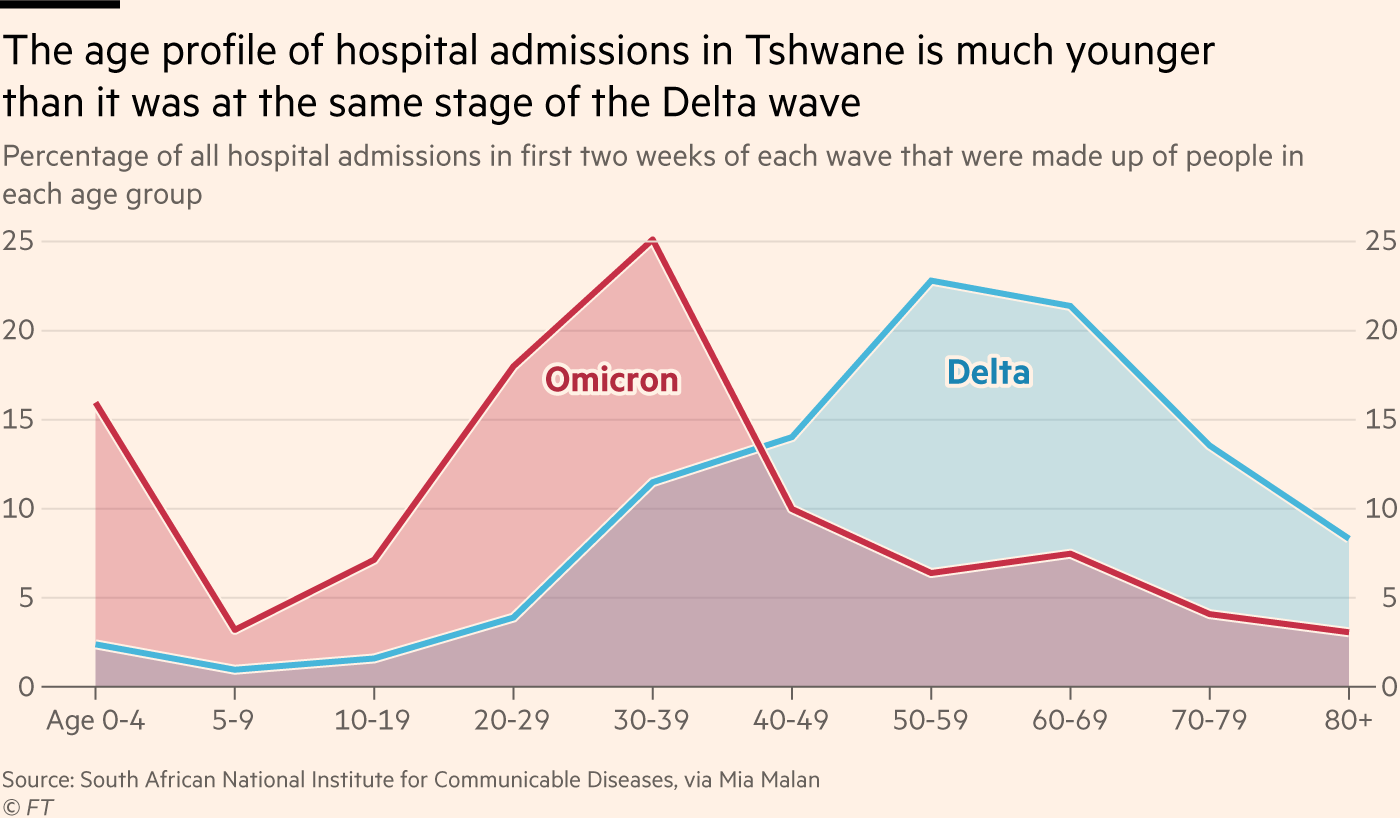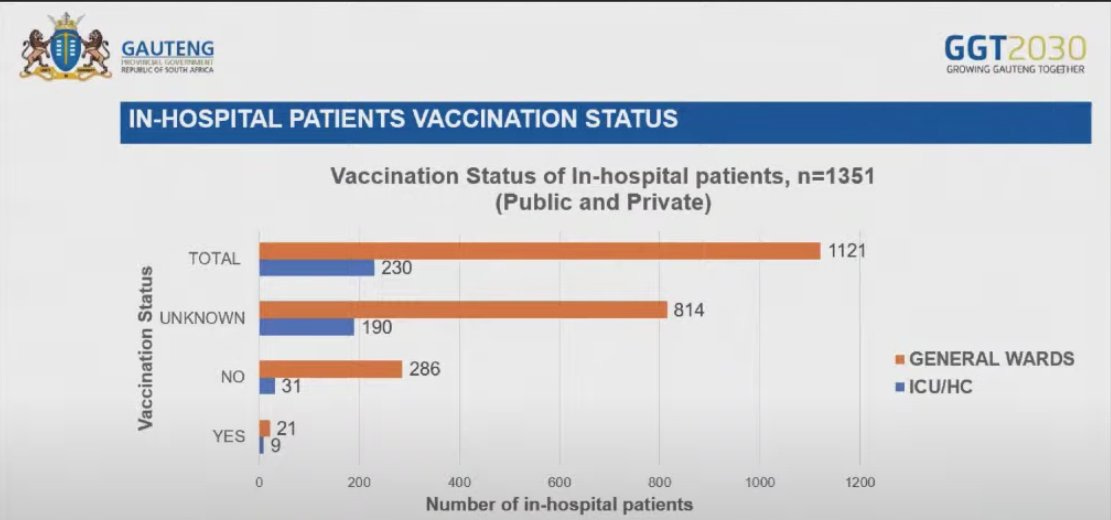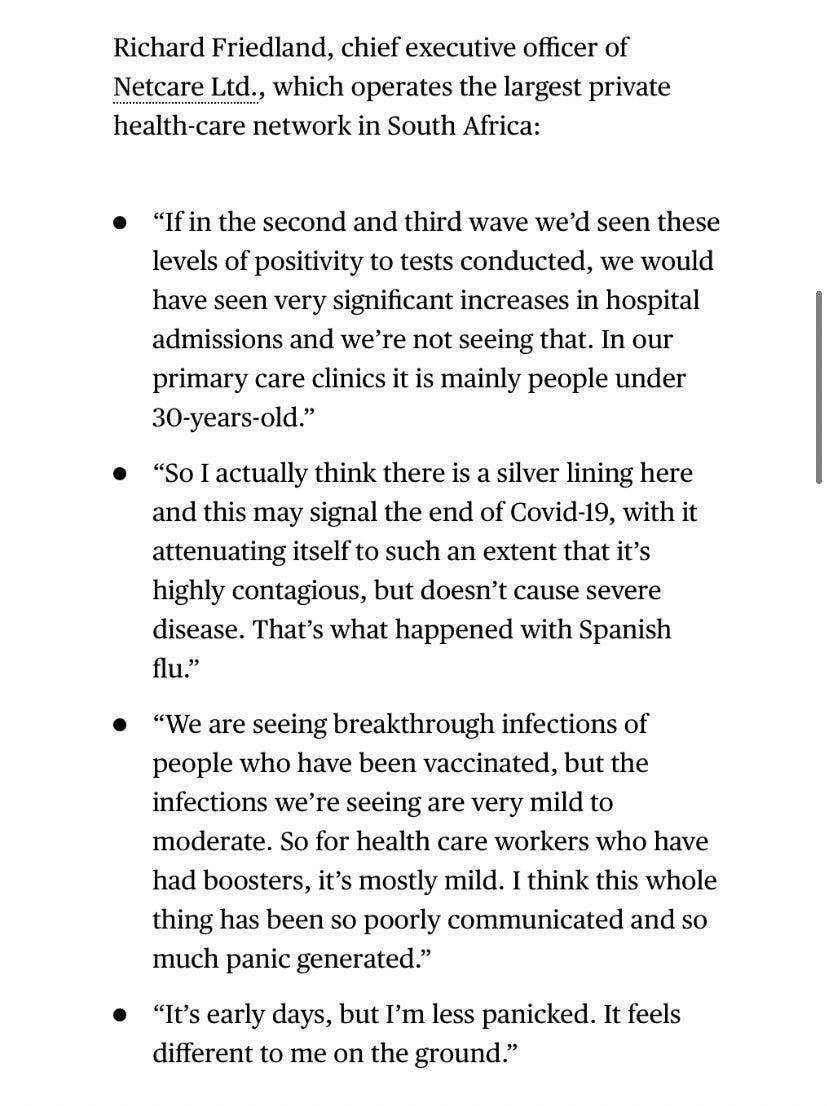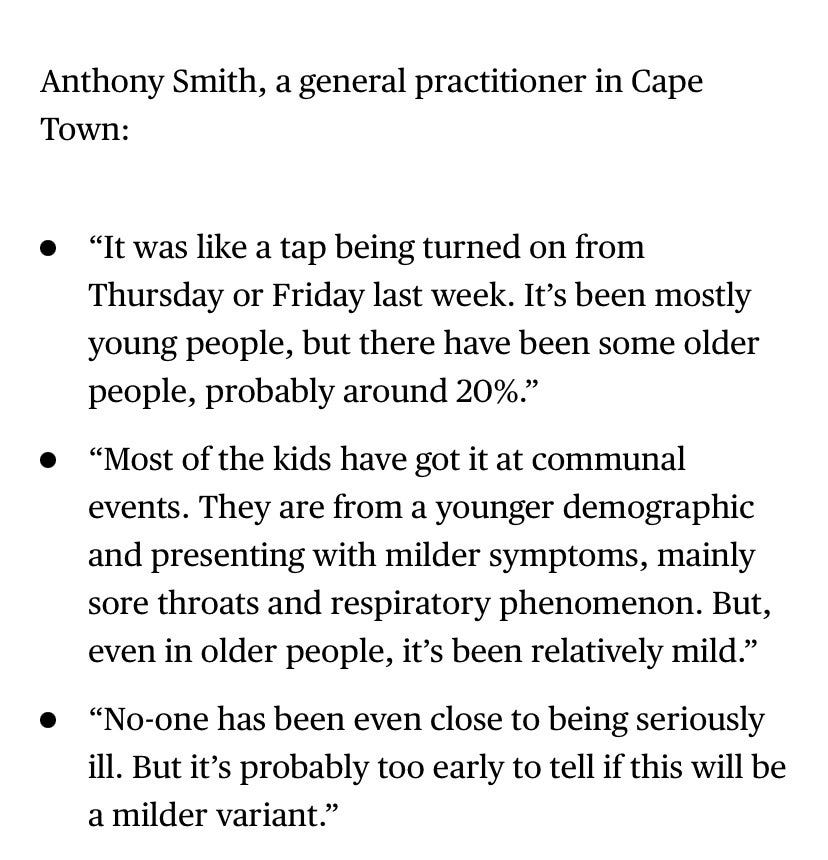A Brief Primer on Omicron and the Best Films of 2021
I had hoped to have written my last post about the pandemic, but unfortunately:
In the 2 weeks or so since South African health authorities alerted the world about the Omicron variant, there has been a mad scramble for information about it. While this is completely inevitable, I do find it dismaying how quickly some were to draw doomsday conclusions from this limited data. We simply still do not know enough to be confident in really any conclusions and the uncertainty remains very large. That said, there are a number of things for which the evidence is becoming slightly stronger on that I will summarise:
Omicron seems to have a transmission advantage relative to Delta. Note that this is different from a transmissibility advantage, as the former says that Omicron is able to grow faster than Delta given certain circumstances. The latter is essentially a statement about the inherent transmissibility of the variant. The reason the two differ in this case is that it seems Omicron is able to evade immunity to some, still highly uncertain, degree, meaning that in South Africa where there are high levels of natural immunity it is able to outcompete Delta as it has a competitive advantage. This does not mean that it has a higher R0 (inherent transmissibility) than Delta and in fact, some think this parameter may be much lower. This has been a large point of confusion, even amongst epidemiologists, and I recommend this excellent blog post on the issue.
Omicron seems like it is able to evade natural immunity, but its ability to escape vaccine-induced immunity is unclear. Panel C in the below graph illustrates that, relative to previous variants, Omicron seems better able to infect those who have previously been infected.
This likely seems to be due to its spike protein mutations, which make it well adapted to evade antibodies. However, we do not confidently know how this will apply to vaccine-induced immunity since only about a quarter of South Africans have been fully vaccinated. Furthermore, vanishingly few South Africans have had a third booster shot whereas in the UK over 35% have now been vaccinated with three doses. Recent data from studies on the third dose suggest it is highly potent against Delta, significantly reducing the probability of being infected relative to those who only had two doses. Some experts think that we have good reasons to think that a third dose will be particularly effective against variants. Note that I am purely referring to the chances of being infected here, not against severe disease which is what ultimately matters. As I will discuss in the next point, we can be optimistic that pre-existing immunity (natural or vaccine-induced) will likely provide high protection against this.
Cases have grown quite quickly in South Africa, although the increase in hospitalisations has been less rapid. The graph below from the FT’s excellent John Burn-Murdoch illustrates this.
While the variant may be better able to escape antibodies, this is not the only defence mechanism in place from immunity. There are also T cells, which are also produced by the body and are thought to provide protection against severe disease. This is why vaccines are more effective against hospitalisation and death than they are merely against infection. The functionality of these T-cells is less likely to be impinged upon by the new variant. Booster doses have been found to generate significant quantities of durable T-cells, which is certainly promising. This may partially explain the dynamics of hospitalisations in South Africa, as these have been more concentrated amongst younger individuals than older individuals, who are more likely to be vaccinated.
Also, Guateng province which has been the epicentre of the SA wave released this data, directly suggesting that vaccines are still working well against hospitalisations.
In this thread, which I encourage you to read in full, there are more indications that the statistics around hospitalisation metrics look a lot better than they did during the previous waves in the region. Putting this together with the previous point, I think a large wave of cases in the UK is possible, but in my opinion, this is not likely to be accompanied by a proportionately large wave of hospitalisations and deaths. The rollout of boosters in the UK forms a key part of my reasoning here. I would really encourage anyone to get one when they can.
There are initial signs that Omicron may be a milder variant. This is highly uncertain at this stage, but I find this collection of quotes from South African doctors quite interesting:
Time will tell of course, but this would not be the first virus to become less virulent over time as this is exactly what has happened with flu over the last century.
While there is still a lot of uncertainty, I think it is worth discussing the potential policy response to the new variant. As I have spoken about previously, I am highly pessimistic that policy can effectively manage the spread of the virus and, in my opinion, voluntary behavioural change is the key driver of dynamics alongside vaccines obviously. Also, see this interesting blog post which discusses how network structure could also explain the oscillations we have typically seen over the course of the pandemic. The initial lockdowns perhaps had justification as they bought time for the vaccine to be developed and rolled out, although I’m still unsure they would have passed a cost-benefit test. There is really nothing to buy time for now, and so, in my opinion, any lockdowns going forward would be devoid of any justification. As I say, I remain optimistic that the vaccines will keep hospitalisations at bay, so the best policy the government could take would be something that gives people as much incentive as possible to get vaccinated. New variants will likely continue to emerge, and so any measures we take now we should be prepared to take every single year going forward and, needless to say, shutting down society every time there is a new variant is not a sustainable way of living. With this in mind, any serious restrictions seem quite ridiculous to me and I don’t think they should be seen as acceptable or proportionate measures. Only time will tell whether or not this is the case.
The Best Films of 2021
Now onto something a little cheerier, as I will combine two of my favourite things: films and list-making. I think 2021 has been a pretty good year in movies, although there has been plenty that I have not been able to see as of yet. I would still like to see: Licorice Pizza, Spencer, The Card Counter, The Tragedy of Macbeth, C’mon C’mon, King Richard, West Side Story, Don’t Look Up, Tick Tick Boom. With that caveat in mind, onto the list:
5) The Power of the Dog
Directed by Jane Campion. Available to stream on Netflix.
A slow burner for sure, but very well made with an excellent lead performance from Benedict Cumberbatch. The film is based on a novel by Thomas Savage, and tells the story of a toxically masculine rancher named Phil (Cumberbatch) in Montana during the 1920s, who essentially wages war against his sister-in-law (Kirsten Dunst) and her son Peter (Kodi Smit-McPhee) when they move into his ranch. Peter is the antithesis of Phil, socially anxious and shy — traits which lead him to be victimised by the ranchers. The relationship between the two characters forms the centre piece of the third act, as we discover that there is more to Phil’s masculine exterior than meets the eye. The film does get off to a slow start, however, and does require some patience. It is beautifully shot in New Zealand (where director Jane Campion originates from) and is a joy to look at, but at the same time will not be for everyone given its slower pacing.
4) House of Gucci
Directed by Ridley Scott. Still in cinemas.
An extremly fun film that doesn’t take itself too seriously, and is very much in on the joke with some of its more ridiculous elements. The film tells the story of the tumultous Gucci family thorugh the 1970s and 80s in Italy, charting the brand’s rise to huge success that coincided with a huge degree of familial politics and drama. Lady Gaga and Adam Driver give two entertaining lead performances, and they are well backed up by Al Pacino and Jeremy Irons who play senior members of the Gucci family. Jared Leto’s performance is completely polarising, but I have to say I found it completely entertaining and hilarious, whether this was intentional or not. This quote from him on the role is unbelievably funny:
“I was snorting lines of arrabbiata sauce. I had olive oil for blood. This was a deep dive I did. If you took a biopsy of my skin, it would come back as parmesan cheese! This is my love letter to Italy.“
Incredible. The only detraction I have is that the film is definitely too long at two and a half hours, and certainly could have been 30-45 minutes shorter.
3) Dune
Directed by Denis Villeneuve. Available to buy on Sky Store.
One of my most anticipated films of the year, and it did not dissappoint. I had not read Frank Herbert’s famous book, but this did not diminish my enjoyment of Dune. This was the one film this year where I had multiple friends imploring me to see it, and it has been very popular amongst audiences with good reason. My concern was that I would find it prohibitively confusing, but this was not really a problem at all. It felt terrific seeing a film designed for the big screen in a cinema, and I am excited that there is a new franchise of epic scale in the hands of Denis Villeneuve, who I think is one of the best directors working today. Great performances from Timothee Chalamet, Oscar Isaac, Josh Brolin and Jason Momoa, but I thought Rebecca Ferguson was especially fantastic. Definitely worth giving this film a watch over Christmas if you missed it in the cinema, and I am looking forward to the second part of the film series already.
2) The Last Duel
Directed by Ridley Scott. Avaliable to stream on Disney Plus.
Matt Damon and Ben Affleck re-unite in The Last Duel for the first time since Good Will Hunting, for which they won an Oscar for best original screenplay and is one of my all-time favourite films. They co-wrote this alongside Nicole Holofcener, and it is a truly well concieved film that is based on the true story of the last duel between Jean de Carrouges (Damon) and Jacques Le Gris (Adam Driver) in medieval France after Carrouges’ wife (Jodie Comer) accuses Le Gris of raping her. The structure is very effective, as the film is split into three parts, each of which tells the ‘truth’ according to each of the three characters. As an examination of medieval misogyny, and the primordial view that the truth could be determined by a fight to the death between two men, it is very effective and resonant. Jodie Comer gives an excellent performance, as does Adam Driver. The climatic duel between Carrouges and Le Gris is an incredible scene, definitely the best of the year for me, and Ridley Scott directs this film wonderfully. Unfortunately, this film was a huge bomb at the box office, which is particularly dissappointing since it is the type of film many cinephiles complain are not made any more. I think a large part of this was due to the poor marketing of the film, as I doubt many people were even aware of its existence.
1) The Father
Directed by Florian Zeller. Available to buy on Amazon, iTunes, Youtube etc.
I really do not want to give too much away about this film, since I think it is best to go in pretty much blind as I did. All I will say is that it focuses on the relationship between Anthony (Anthony Hopkins), who is suffering from progressing dementia, and his daughter Anne (Olivia Colman) who looks after him. It is heartbreaking and I don’t think I could watch it again, not for a while at least, but it is incredibly powerful. Anthony Hopkins was absolutely deserving of best actor in this, I really have not seen anything else like it. Just a brilliant piece of cinema in short.








